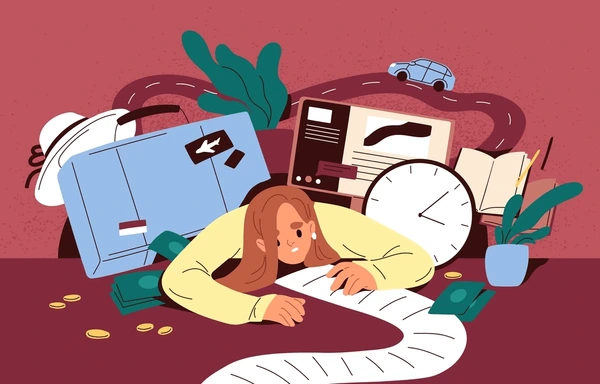When social media is dominated by glow-up tutorials and hot girl summers every July, it’s easy to get lost in how others are spending their time off — making plans for the fall, learning new hobbies, waking up at 5 in the morning to go for a run. Being away from the workplace or school makes it easier to imagine your peers gaining a head start during these few months while you feel yourself falling behind.
This is known as productivity guilt, the feeling of shame for not doing something society considers ‘useful’. Since summer lacks the structure and routine of a regular week, you may feel the need to justify how you spend your free time. And with a constant stream of achievements and activities flooding social media, it’s hard not to feel like you should be taking advantage of your time off.
This guilt is also fueled by capitalist pressure in society — similar to ‘hustle culture’ — to prioritize working and constantly earn profit. A capitalist economy functions only if workers are productive; thus those who cannot or do not want to work are not considered ‘valuable’ members of society. As associate professor of political science Anders Hayden explains in the article “I Don’t Deserve To Be Burned Out: How Capitalism Complicates Rest”, “Capitalism [is] a system that doesn’t have a sense of there’s ever enough. No matter what you’ve achieved, there’s always “more” to do, a standard that’s constantly escaping grasp.” There is stigma around sick days or mental health days, because they preclude people from working.
So, how can you beat summer productivity guilt?
First, realize that being busy isn’t the same as being productive. Cramming activities into every hour of the day so you always have things to do is a quick way to get burned out. James Clear, author of “Atomic Habits”, explains, “We often assume that productivity means getting more things done each day…Productivity is getting important things done consistently.” Tasks that genuinely contribute to your goals should be done efficiently and without distractions. This may look like setting aside 1-2 hours every day dedicated to working on a project, answering emails, or reading.
Second, set aside time for yourself. Allowing yourself to relax and recharge is necessary to work productively in the long term. For example, put away any work-related tasks you have after 9 p.m., and spend some time before bed catching up on the latest TV series. Taking a step back away from the rabbit hole of work can help you reflect and make necessary changes to your goals.
Third, know what you want to get done before you start. Without a clear objective in mind, there will always be something more to do, and it can be hard to tell if you’ve made progress or not. Make to-do lists to keep yourself accountable and on track.
With August quickly approaching, remind yourself that no matter how many items you’ve ticked off your to-do lists, you deserve a break. It is summer vacation, after all.


